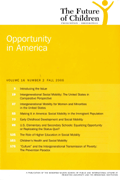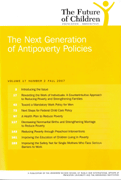


Book
Americans believe economic opportunity is as fundamental a right as life, liberty, and the pursuit of happiness. More concerned about a level playing field for all, they worry less about...
Americans believe economic opportunity is as fundamental a right as life, liberty, and the pursuit of happiness. More concerned about a level playing field for all, they worry less about the growing income and wealth disparity in our country. Creating an Opportunity Society examines economic opportunity in the United States and explores how to create more of it, particularly for those on the bottom rungs of the economic ladder.
Ron Haskins and Isabel Sawhill propose a concrete agenda for increasing opportunity that is cost effective, consistent with American values, and focuses on improving the lives of the young and the disadvantaged. They emphasize individual responsibility as an indispensable basis for successful policies and programs.
The authors recommend a three-pronged approach to create more opportunity in America:
• Increase education for children and youth at the preschool, K–12, and postsecondary levels
• Encourage and support work among adults
• Reduce the number of out-of-wedlock births while increasing the share of children reared by their married parents
With concern for the federal deficit in mind, Haskins and Sawhill argue for reallocating existing resources, especially from the affluent elderly to disadvantaged children and their families. The authors are optimistic that a judicious use of the nation’s resources can level the playing field and produce more opportunity for all.
Creating an Opportunity Society offers the most complete summary available of the facts and the factors that contribute to economic opportunity. It looks at the poor, the middle class, and the rich, providing deep background data on how each group has fared in recent decades. Unfortunately, only the rich have made substantial progress, making this book a timely guide forward for anyone interested in what we can do as a society to improve the prospects for our less-advantaged families and fellow citizens.
Related Books

Isabel V. Sawhill, Sara S. McLanahan
August 31, 2006

Gary Burtless
July 1, 1996

Ron Haskins, Isabel V. Sawhill
September 15, 2007
Authors

Ron Haskins is a senior fellow in Economic Studies at the Brookings Institution, codirector of the Center on Children and Families at Brookings, and a senior consultant at the Annie E.Casey Foundation. He was an adviser to President George W. Bush for welfare policy and a senior staff member of the House Ways and Means Committee, where he helped write legislation on social policy. He is the author of Work Over Welfare:The Inside Story of the 1996 Welfare Reform Law (Brookings, 2007) and coeditor with Rebecca Blank of The New World of Welfare (Brookings, 2001).
Isabel Sawhill is a senior fellow in Economic Studies at the Brookings Institution, where she holds the Cabot Family Chair and serves as codirector of the Center on Children and Families. She previously served as an associate director at the Office of Management and Budget. From 2003 to 2006, she was vice president and director of Economic Studies at Brookings. She is the editor of One Percent for the Kids: New Policies, Brighter Futures for America's Children (Brookings, 2003), coeditor with Alice Rivlin of Restoring Fiscal Sanity 2005 (Brookings, 2005), and coauthor with Rudolph G. Penner and Timothy Taylor of Updating America's Social Contract (Norton, 2000).